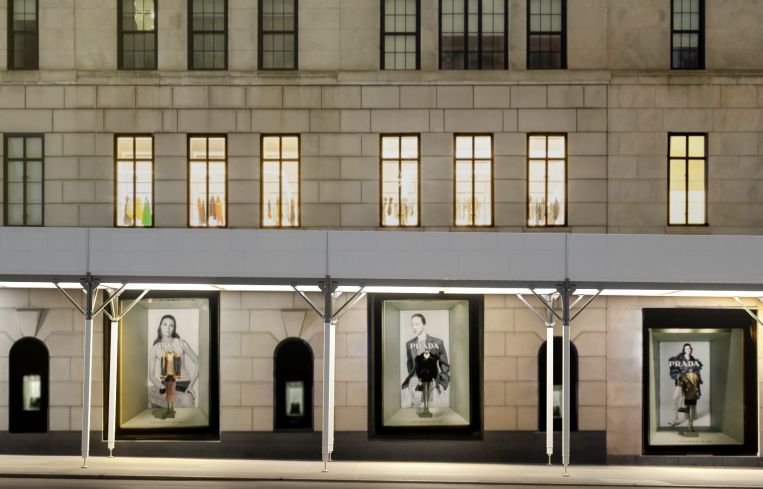New Company Shed Pitches Affordable Scaffolding Alternative to Urban Umbrella
By Rebecca Baird-Remba September 20, 2023 4:38 pm
reprints
A new scaffolding manufacturer, Shed Innovations, aims to compete with Urban Umbrella by making a better looking scaffolding than traditional ones, but at half the price.
SHED, as the company is known, claims that its new scaffolding can provide an aesthetically pleasing alternative to sidewalk sheds found throughout New York City, which tend to be made of metal pipes and wooden boards. SHED also says its sheds come in at least 50 percent cheaper than rival Urban Umbrella.
Its founders, a Manhattan real estate heir and an executive at a private equity firm, claim their product can be erected two and a half times faster and with 40 percent fewer workers than traditional scaffolding systems. The new firm, which recently raised $1.2 million in seed funding, unveiled its product Tuesday at a proptech conference and hopes to start shipping it early next year.
“SHED is introducing a cutting-edge, cost-effective scaffolding solution that will reshape the industry by improving the experience for businesses, pedestrians and the city,” Steven Manocherian and Marco Libani, the co-founders of SHED, said in a joint statement. “Our innovative scaffolding is the first of its kind — it assembles faster, requires less manpower and uses fewer materials — all while ensuring our public spaces remain vibrant and welcoming to foot traffic.”
The city has struggled with long-term sidewalk sheds obcsuring the sidewalks for years because of Local Law 11, which mandates facade work and a cycle of exterior inspections once every five years for mid-rise New York City buildings. Urban Umbrella was founded in 2009 hoping to offer a better looking option with curved, white metal supports holding up its sheds, according to its website. The company raised $6.5 million in venture debt funding last year.
However, Urban Umbrella is quite pricey, charging $45,000 to install a 200-foot-long shed and another $5,000 a month in rent, Crain’s New York Business reported in 2021. A standard, similarly sized metal and wood sidewalk shed might run somewhere between $25,000 and $45,000 to install plus $1,300 to $1,800 a month to rent.
While SHED has not finalized its pricing, a spokesperson for the startup said that it was “targeting a middle market that is currently untapped. They know that at a minimum, their product will be 50 percent less expensive than the luxury standard.”
It also said its product will be the first screw-less scaffolding product, featuring locking fiberglass and steel pieces that can be assembled faster, with fewer pieces and requiring fewer workers. The look is simpler than Urban Umbrella — with single metal poles that hold up scaffolds using four short metal supports — but it presents a cheaper alternative for landlords who want a non-ugly scaffolding option. SHED also offers customization options, including colors, lighting, heat lamps and signage.
While its company is new, its founders aren’t strangers to New York City real estate. Manocherian is one of the heirs to the Manocherian Brothers real estate empire. The company and its sister firm, Pan Am Equities, own several Manhattan buildings, including 750 Broadway, One Astor Place, The Langham on Central Park West and New York Plaza at 2 Water Street. Manocherian and his partners have purchased and renovated various affordable residential buildings in the outer boroughs over the past few years, according to a SHED spokesperson.
Libani, meanwhile, is the vice president of capital formation at private equity firm Certares and has worked on “two other startups focused on advertising and construction,” according to his company bio.
But SHED faces stiff competition in beautifying New York’s scaffoldings. Urban Umbrella claims it is the only scaffolding alternative currently approved by the New York City Department of Buildings. Urban Umbrella also sued a competitor, Universal Builders Supply, in March for allegedly ripping off its patented design to create a similar product called Canopy.
“We’re incredibly grateful to have been the first movers and innovators in this space and our growth as a company has created a larger conversation that now, fortunately, the city is acting on,” said Ethan Polsinelli-Montero, the director of sales at Urban Umbrella, in an email. “Our product has always been viewed as a luxury offering and we’re grateful for the traction we’ve gained in that niche, but through years of dedication, research, and experience, we’re finally in a position to roll out a fleet of material that upholds all of the aesthetics we’re known for, while being significantly quicker to install and thus allowing us to pass through savings to a wider demographics of professionals who have wanted to use our system but were not able to afford it.”
However, DOB recently put out a request for proposals seeking better sidewalk protection designs. SHED is considering the city’s RFP.
In July, the DOB announced policies aimed at getting sidewalk sheds down faster, including a $10,000 penalty for buildings that fail to complete Local Law 11 work within 24 months. The city also plans to study ways to reform the cumbersome facade inspection law, which has led to more than 230 scaffolds across the city remaining up more than five years, according to Manhattan Borough President Mark Levine.
Rebecca Baird-Remba can be reached at rbairdremba@commercialobserver.com.



